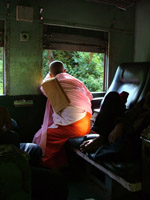
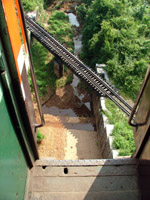
The train to Thazi leaves Shwenyaung at eight o'clock each morning, so I left the hotel at twenty to seven, and went to where the pickups leave Nyaungshwe for Shwenyaung. The local pickup that covers the route was practically empty, and the driver warned me that it may be several hours before they left. I managed to persuade a Taunggyi-bound pickup that was already half full to drop me at the junction on their way through, which they agreed to do provided I pay the full fare to the town two hours away. After ages we were full enough to leave, and we trundled along the road, making the eleven-kilometre journey in the standard time of thirty minutes. I grabbed a trishaw at the junction and arrived at the station at ten to eight, to see the train already at the station. I hurried to the station master's office and paid $7 for an upper class ticket (this is higher than first class - on this train there were just to two classes: upper and ordinary), and was escorted to my seat. At dead on eight, the whistle blew, and we were off.


On my request, I had been given a forward-facing window seat, and found it to be a well-padded leather recliner. It was certainly comfortable, although the thick metal arms made it difficult to lean out of the window without risking a fractured rib. I sat opposite a snooty-looking man, who spent much of the time looking down his nose at the other people in the carriage. A chubby nun sat on the other side of the carriage, shielding her face from the sun as she looked out of the window. The train moved at a sedate pace, occasionally picking up a rocking movement from side to side. The track wound around itself as we lowered in altitude, with viaducts taking us over sections of track we were soon to be on.
At many of the early stations, mini-markets were held on the platform, selling locally produced fruit and veg. A number of women that I came to think of as corridor squatters bought up huge quantities of produce, which was stowed under seats, in the spaces behind the recliners and on the overhead luggage rack. I realised that there were two types of conductor on the train: white-shirted men in charge of passengers; and blue-shirted men who were responsible for the vegetables. They squatted with the women in the corridors, drawing maps on the back of airmail envelopes showing where they had stashed each woman's goods. I think that this practise was not strictly above board, as at one stop a man who had similarly loaded a number of sacks of veg on, and stowed them wherever he could, was told off by a railway policeman. The copper shouted a lot, and made the man remove his bags and get off.
I learnt the routine at stops; at the bigger towns, the train would stop for up to half an hour, and would always toot the whistle a couple of minutes before leaving, and again as they slowly pulled away, many people reboarding after the train was moving. This made me confident enough to get off at one of the stops, where I bought some roasted soya beans to munch on, and an avocado that cost 2 cents. Back on the train I leaned out of the window to buy some fudge from a woman balancing a tray of sweets on her head. It had a slightly chalky texture, and was so sweet that I had to take a break in between squares. At each of the earlier stops the two armed policemen that were guarding the train got off and patrolled up and down outside. One was a very tall young man, and I noticed that as well as having a battered wooden rifle slung over his shoulder, he also had a catapult in a little pouch marked "police" attached to his belt.
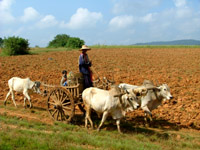
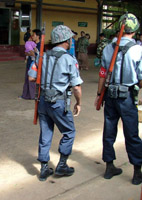
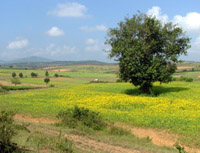
We continued our slow journey downwards, the landscape changing along the way. There were less trees now, and the earth had become a bright red. Large, spiky succulents grew on the slopes, while an abundance of yellow flowers covered the meadows in between. There were large valleys, and rolling hills; fields ploughed by bullocks. I've developed a bit of a thing about cows since I've been in Myanmar, especially the hump-backed beasts that dominate here; and my love affair with water buffalo continues unabated. Our speed was slow, and some men took advantage of this by clambering up onto the roof of the train. They ran down the length of the carriage, their footsteps banging overhead like dodgy pipes.
In the early afternoon we began to zigzag down a set of switchbacks, alternating between going forwards and backwards, and stopping at stations in between. At one of these there appeared to be a bit of a festival going on: drums and gongs, singing and dancing. Sometime later I thought I could still here the noise, and looked out of the window to see the band and hangers-on having a party on the roof of the rear carriages; it was several hours before they ran out of steam. The policemen no longer guarded the train now, though they sometimes got off for tea. They were becoming more undressed as the day went on: first they lost the hats and jackets; then the guns went by the wayside; shirts were the next to go, and the last time I saw the elder of the two, he was wearing a T-shirt, and had one leg of his trousers rolled up to the knee, while the other was still tucked into his boots.
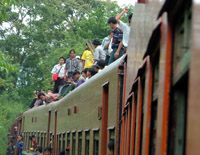
At one stage we passed a rubbish tip on the outskirts of a town, where women and children picked through the trash, and pigs that had been rooting around were sent squealing in terror by the train. At one point we passed close by a quarry, where rocks were being broken by men with pickaxes; was this some of the forced labour I had heard about before coming here? I've wondered the same when I've seen groups of women digging at the side of the road, but with no one to tell me, it's difficult to know. None of them looked too happy in their work, but then how many of us enjoy our work, and set about it with a smile?
We passed through a forest, thick with trees. At first I enjoyed it, looking at the big trees, and the creepers that spread from tree to tree, looking like a child had scribbled on the scene. After a while, though, I began to feel hemmed in by the vegetation; trapped in my comfortable seat. The journey was beginning to drag. I thought back to some of the fun train trips I'd had in Thailand, and remembered that I most enjoyed travelling in between carriages, watching the view from the doors, and hanging out with the locals. I went and sat with the corridor squatters for a while, sharing the spread-out sack of a woman sat in the doorway. This felt much better, and I exchanged nods, smiles and the few words we had in common with those around me. I determined to travel ordinary the following day on the trip from Thazi to Bago.
Sometime after five the train pulled into Thazi station, and I said "ta-ta" to those in the corridor - ta-ta is Myanmar for goodbye, spoken with a heavy T, almost a D sound. Did the British introduce the phrase to Myanmar, or did we take it from them, I wonder? Incidentally, they also use "okay" for yes here (which the Lonely Planet transliterates as houq-keh, just to confuse the issue, I think). An employee at the station took down my name and passport number, and told me to come at eight the next morning to buy my ticket; the train would arrive at half-past nine. Another employee escorted me to the only guest house (at least the only licensed for foreigners) in town. The rooms were above a family restaurant, and they were stiflingly hot, being under the tin roof. There was a basic room for $3, or an en suite with air con as well as a fan for $5. I chose the air con, for just about the first time ever, I think. The nice lady told me that I wouldn't be able to use it until the government electricity came on at eight, although I could use the fan while they were on generator power. I showered then lingered over my dinner, waiting until eight so I could cool the humid room down. I felt exhausted, and was asleep before nine, waking up shivering a couple of hours later to switch off the air con.
---------
I was at the station the following morning just past eight o'clock and, after a few false starts, I found the office where I should buy my ticket. I had been told the previous evening that there was only one class on the morning train: ordinary. This suited me perfectly, and I handed over a ten-dollar note for the eight-dollar fare. This produced the usual kerfuffle, as they had no change to hand, wouldn't let me pay in kyat, and offered only 2,000 kyat in change, which I wouldn't except due to the bad exchange rate. I could probably have found the exact change if I looked hard enough, but I enjoyed making mischief in this way; if they insisted on only taking dollars, then they could find the change in dollars too, which they did eventually. I was told that the train would arrive on platform one at nine thirty, and arrive in Bago at eight that evening.
The platform had no shaded areas, except for in a small tea shop, so I killed some time over tea. Just before nine a train arrived, and I stupidly suspected that it may be my train come early, so paid up and left. It wasn't, but I saw a line of four plastic chairs lined up half in the shade and sat down. The train left, and I got out my book (Jane Austen's Northanger Abbey) and began to read. A while later there was an influx of people on the platform, and I put my book away, thinking that a train must be imminent. I wasn't wrong, but it was another Mandalay-bound train; it was quarter to ten now. A few people came and went from the chairs alongside me, and now a young man with a straggly beard sat down in the seat next to me. He struck up a conversation, asking the usual questions, in between chatting with two Myanmar men sat on the other side of him, and an old woman who was sat on the floor - chivalry's well and truly dead here.
After some time he said to me, "I think you are rich." I replied that I was not rich; that things were more expensive in my country, therefore wages were higher; and that when I brought money I had earned at home to this country, it went further. He chatted with his friends a while longer then said, "But you are rich; I think you are." It's a tricky thing to argue against because, comparatively speaking, of course we are rich; if we can afford the airfare then we are much richer than the average person.
"No," said I. "At home I am not rich - things are very expensive in England, for example a packet of cigarettes is about $8 or $9."
"Ahh, you smoke! You smoke cigarettes!"
"No," I replied - I was about to add that I'd given up, then remembered what Mr Bean had said about only prostitutes smoking cigarettes here. "I'm just giving that as an example."
"Yes, you smoke. I think you smoke," declared the annoying man, gleefully. I went on giving further examples of the price of bread, a cup of tea and rent. I almost quoted the price of a pint of beer, but stopped myself. I could see where the conversation was leading, but fortunately a railway official came along and moved the bunch on. I was gathering my own possessions up, but he said I could stay put, so I did. The encounter left me with a tinge of paranoia for the rest of the day, about what an affluent foreigner I was. I imagined people looking at me with accusing eyes whenever I went for my camera.
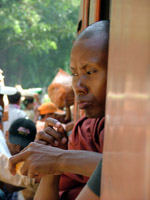
I returned to my book for a while, to be distracted by a young novice rattling his alms bowl under my nose. I gave him a small amount, but shook my head at the next monk, and ignored the begging nun - none of them were after food here, just cash. By half past ten I grew bored, and put down my book in favour of trying to work out whether the men on the platform were wearing any underwear beneath their longyis. A while later the old woman who'd been sat on the floor during the earlier exchange came and sat next to me. Having been told that I was rich, she thought she'd try her hand at getting me to share some of that wealth, and spoke to me for some time, her sign language conveying that she had no money for food, and that I seemed to have plenty. I answered her in English, and we carried on our strange conversation for some time. Nearby a monk, with almost Nubian features, walked over to the edge of the platform and did a big nose-spit on to the tracks, covering first one nostril, then the next. From platform two another monk spat a stream of red onto the rails, and walked away chewing. I heard the pitiful cry of a child, and looked up to see two goats being driven down the steps of the pedestrian bridge across the tracks.
At last, at a quarter to eleven, the train arrived. My seat was opposite a man whom I immediately warmed to, as he looked quite like the excellent Mr Bean. He had passable English, and told me the names of the towns we passed through during the first hour of the journey; I was sorry when he and his travelling companion got off. This now left the bench seat vacant, and I received the bag that was passed to me through the train window by a family waiting on the platform. Two more bags followed the first, and then their youngest child was handed to me. I was a little surprised, and took extra care not to bump him against the window frame. The parents and older brother entered the carriage the regular way, and once the father had got his family settled, he disappeared for an hour or so. The small child scowled the whole journey - at everything in general and me in particular. He stared at my hair, and I wondered whether I was the first white person he had seen. Every time I looked over at him he was scowling at me. When his father returned, I saw where he got it from, as he too had a permanent scowl; a matching pair. The father reminded me a bit of Tony Soprano; he was of similar build, but I think it was the vest that did it, which he unbuttoned his shirt to reveal. The elder brother appeared to have more his mother's temperament; a good-natured boy, who was kind to his younger brother, though this didn't seem appreciated. He stopped the small boy from leaning out of the window when the trees were too close, and got a smack for it, as the younger child had whined. As an older sibling myself, I felt sympathy!
The train made good time as we sped along the plains, past fields where people stooped to pick chillies, and big mats where they were laid out to dry. I regretted my decision to throw away my sunglasses though; the lens had cracked, and I'd been concerned about getting splinters of glass in my eyes. I was constantly trying to blink away dust on the journey, determined not to be kept from my view. As on the previous day, I most enjoyed the stations, and took photos of those doing business there. I am grateful to the warm-natured Myanmar people for helping me to overcome my inhibitions over taking shots like this. There were many water girls at each stop, each with a ceramic jar of water balanced on her head, with a plastic plate placed over the opening to protect the contents. For a few kyat the passengers could buy a glass of water, or have their plastic bottles refilled. I had noticed large jars of water in many places, during my time in Myanmar - at temples, by the side of the road, in restaurants - and had been told that lime was used to purify the water.
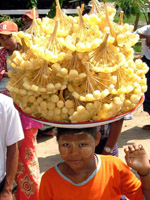
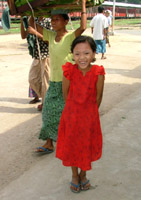
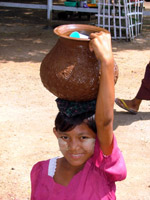
Inside the train, a constant stream of hawkers passed along the aisle, raising their voices in a sing-song sales pitch. The boys selling quails' eggs (they are not quails' eggs, I am sure, as I've not seen a quail here, but I think of them as such. The small eggs are brown and speckled, and they are in abundance all over the country) sounded as if they were shouting "Romeo, Romeo," and my mind kept filling in the "Where for art thou, Romeo?" They were joined by the betel-nut sellers, of course; folk with plates of barbecued meat on skewers, and other such delicacies; and women balancing trays of fruit on their heads - quite a feat on a moving train, I thought.
The wooden seat was not too uncomfortable, even with three people sat on it, and I had a decent amount of legroom - I could change the position of my legs at least. About six hours into the journey, though, I found myself becoming bored. I figured that it would be nine at the absolute earliest before we would reach Bago, so I tried not to look at my watch too much. We didn't stop at every station, but at those we did, more and more people got on - always more than got off. From my seat it didn't look like the aisle was too crowded, but when I got up to go to the loo I realised how many people were sitting on the floor, as I gingerly negotiated my way through them. At half past five I noticed through the crowd that the sun was setting on the opposite side of the train. I strained my neck for another glimpse, then made the most of the view from my own window. An hour later the sky was inky, and details of the landscape mere silhouettes. Not long after that it was all dark, save for candles and small cooking-fires in the rattan dwellings alongside the tracks; I pondered on the fire safety issues awhile, and then I am sure that I saw the criss-cross pattern of rattan catching alight from a candle. I suppose it may have been my imagination, though - and either way, there wasn't a lot I could do about it.
I remained glued to the open window, watching flickering fireflies sending Morse code messages to one another, and far-off flashes of lightning. I cupped my hand around my eyes as I looked, both to cut out the glare from the light, and to stop bugs getting in my eyes. There were so many moths flying past the window, lit up in the light from inside the train, that it looked like it was snowing outside. Only a fraction of them managed to make it inside, but that was still too many, and the passengers (myself included) were looking like they had nervous tics, as they brushed away the insects. From the window I noticed patches of ultra-violet light dotted around the countryside, and guessed that it was for the same reason as in Cambodia: crickets. There I had seen strange contraptions set up in fields: a white sheet propped up like a sail above a rectangular pool of water, like a boat with the water inside instead of out. Ultra-violet light was shone upon the sheets, to attract crickets, who jumped at the light, hit the sheet, and fell into the water below. There they drowned, and so could be scooped up the following morning. Mr Bean had told me that they were almost in season, smacking his lips and rubbing his tummy as he did so.
I'd already worked out that we were not going to be in Bago by nine, but it was from then on that I began to really run out of patience with the train. In some ways it would have been better if I had been going all the way to Yangon, as at least I could have rested, safe in the knowledge that it would be impossible for me to miss my stop. As it was I had to keep my wits about me. I knew the name of the next biggish station before Bago, so peeled my eyes at every one we passed through, hoping for a sign that we were near. Being a so-called express train, we didn't stop at every station, but at those we did I watched people struggle through to the door - some electing to jump out of windows instead - and dreaded the time when I would have to do the same; I almost wished I were staying on till the end of the line for that reason alone...almost. The remaining hawkers were moving in convoy now, four of them grouped together worked their way through the jam of people in the aisle, slowed by those sleeping - or trying to - on the floor.
Still, things could have been worse - the lights were out in the carriage in front of ours - although with the amount of insects that were flying around ours, I wasn't entirely sure that that was a bad thing. Suddenly there was a scream from somewhere behind me, which I heard even through my headphones, and I whipped them off quick to see what was going on. In the row behind mine, on the opposite side of the train, a young girl was screaming hysterically, and all hell was breaking loose. There were so many people in the aisle - all on their feet now - that I couldn't see what was going on, even though it was taking place just a few feet away. An old man in a trilby hat took charge; he called out for something - a doctor, maybe? I thought - and was handed leaves used to wrap betel nut and a lemon. The citrusy smell filled the carriage, as the lemon was thrust under the girl's nose. I got a glimpse of her, and her eyes had rolled back in her head; I wondered whether she'd had a fit. Whatever the cause, the poor thing came round to a throng of people staring at her. In case you are curious, I am guessing that the betel leaf was called for as a smelling salt, as a white substance that is partly made up from lime is painted on the leaf before it is wrapped around the betel nut.
The commotion over, my boredom returned, although I was able to amuse myself for a while watching a man doing sign language in his sleep - is this how the deaf sleep talk, I mused to myself? This chap was sat on packing cases stacked in the open doorway (and I later discovered when I walked past him that he was pissed), swaying around in a dangerous manner, considering his position. Every so often he would lift his arms up, holding them out in front of him, and spell things out with his fingers. By half-past ten I was feeling irrationally irritated. My jaw was clenched, and I was tapping my fingers against my leg impatiently whilst glaring out of the window and huffing angrily - I'd been trained to recognise the non-verbal indicators of someone about to blow, and could see them in myself; I'd had enough. Just as I felt I would surely have to throttle somebody (my money was on the father of the family - he'd moved to the seat next to me, and was sat on it cross legged, squashing me against the wall), I saw the sign for the station before mine, and breathed a sigh of relief.
I checked my watch at least once a minute for the remaining way, and tried to work out how the hell I was going to get off the train with my bags. As the lights of the town came into view, I struggled to get my pack down from the luggage rack, cursing the fat father for neither helping me nor moving to allow me room to reach it easily. I needn't have worried about getting off the train, though, as this was where most the passengers were getting off - it looked like there would be plenty of seats for those continuing to Yangon. Hundreds of us poured from the train - never before have I been caught up in a mass of humanity like that, and I was grateful of having bags in front and behind, as they acted as a buffer zone. I thought of us as a human river: the few people and their bags waiting to get on the train were rocks along the riverbed; those that stopped mid-flow to look for loved ones were eddies; the gateway that we were squeezed through was a rapid; and, as we reached the entrance of the station, the steps were a waterfall - potentially, anyway, fortunately I kept my feet.
As we broke away from each other, becoming individuals again and going our separate ways, I realised that there was another hurdle to cross: tens of trishaw riders, all keen to grab a fare. I snarled and snapped, turning down offers and refusing to answer "where you from" questions. Book in hand, I tried to get my bearings, knowing that the Emperor Motel I'd chosen to stay at was just a short walk away...provided I went in the right direction. I asked where the main road was, and one rider told me one way, another the opposite. Growling I stomped on, while one young lad cycled alongside me, assuring me that he knew the hotel, and I was going the right way, but why didn't I get on the trishaw, it was only 100 kyat? Grudgingly I did, after working out that he wouldn't be trying to rip me off, or get commission from the hotel, but was simply hoping for my business the next day, for a tour of the town. At the hotel I was shown three identical rooms, all with air con, tv and fridge, and told that they cost $6 a night. I asked for a fan room, and the man replied that they did have fan rooms, but the price was the same and they didn't have televisions. I selected the room that smelt the least and paid for two nights, asking for some Chinese tea to be brought to my room - I'm getting so demanding! I showered and watched BBC World, sipping my tea and killing the ants that swarmed on the floor with my flip-flops - I knew that homicidal urge was going to have to be satisfied somewhere.
---------
I slept in this morning, as much as the noisy traffic on the busy main road would let me. My left eye was a little swollen and would stop watering, the tears stinging the tender skin around my eye; I really must replace my sunglasses. It was gone ten by the time I made it downstairs (I'd got sucked in to a stupid film about boxing, but fortunately a power cut saved me), and the young lad from the night before was waiting. I told him he'd have to wait a bit longer, and popped to the tea shop next door for some breakfast. On my return I tried to get him to tell me how much his tours were - he kept saying they were as much as I wanted to pay, but I hate it when people say that. Eventually I got him to give me a price - 3,000 kyat. This sounded reasonable, so I didn't haggle, and we set off.
He introduced himself to me as Myo Min Han. Despite his baby face, he was 23 years old and married with two children; he'd also taken over responsibility for his sister's three-year-old child when she had died. He, his wife and the children lived with his parents and his maternal grandmother, who was 82 years old. His father was also a trishaw driver, and spoke good English, which Myo was trying to learn. He told me he'd been doing his job for three years, since he had married - he'd not worked before then. The trishaw was not his, but leased at a cost of 300 kyat a day; they cost $150 new, and he hoped one day to have his own. Apart his dead sister, Myo had a younger brother, who was twenty years old, and a soldier based at the Thai border.
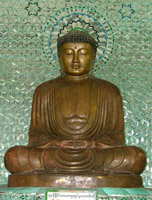
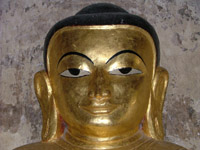
He took me to those sites around town where admission was free; there are a number of others that tourists should pay a $10 fee to see, but if you wait until after four o'clock you can visit for free, and he took me to these later. By this stage of my trip I felt I had seen enough temples in Myanmar to last me, but I was pleasantly surprised by Bago's sites. I found the Buddha images here to be the nicest I've seen in the whole country, some wonderfully serene-looking statues. At the risk of being offensive, I've been of the opinion that some of the Buddha images here have been downright ugly. The one that particularly sticks in my mind was a statue in Bagan that was the spitting image of Rowan Attkinson - how could you pray to that? There were some elegant representations here, though. Myo also took me to a temple known as two-snake temple - although one of the snakes has slithered off into the forest. The remaining python was the biggest snake I have ever seen - an absolute monster of 16 feet, with the fattest body - he was a real beauty. They say he is 150 years old, and that he weighs 65 kg - but I felt sure he must weigh more, he was huge.
The town is famous for having a huge reclining Buddha - 16 metres high and 55 metres long, nine metres longer than the one at Wat Po in Bangkok. Bago actually has three massive reclining Buddhas, though, one of which is still being built. The most famous, Shwethalyaung Buddha - who's big toe is nearly two metres long - was built in 994 AD, and was lost to the jungle for over a hundred years when the city was sacked in 1757. We finished with a visit to Kyaik Pun Paya, which was quite a way out of town. Here four 30-metre Buddha statues sit with their backs to a central pillar. It The sun had set by the time we got here, and it was very dark by the time we arrived back at the hotel, and Myo must have been quite worn out - we covered a fair bit of ground during the day. Instead of giving him the 3,000 he had asked for, I gave him $10, and felt that he had certainly earned it.
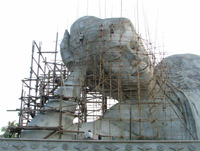
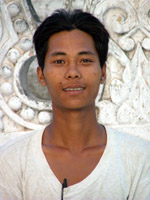
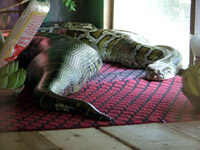
 Visit SerenityPhotography.co.uk, where you can buy beautiful pictures from around the world...all taken by yours truly! |